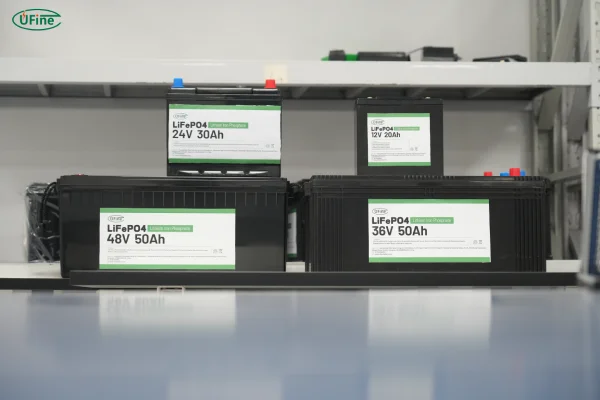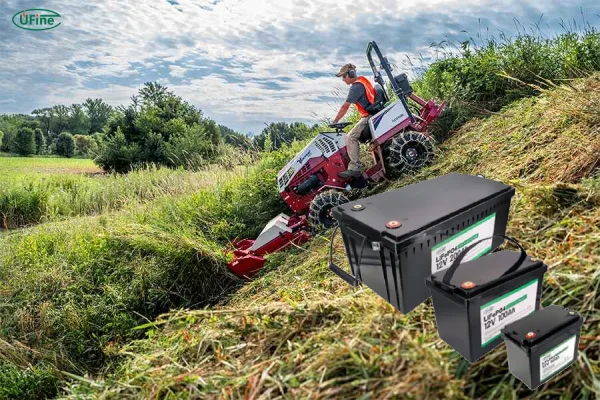Part 1. Lawn mower power sources: an overview
Lawn mowers, particularly tractor mowers, require a power source to operate the engine and other key components like lights and accessories. Historically, gas-powered engines were the norm for riding mowers, but battery-powered mowers have gained popularity due to their eco-friendliness and ease of use.
There are two primary power sources for tractor mowers:
-
Gas-powered Mowers: These are powered by internal combustion engines. They tend to be more powerful and capable of tackling larger areas of land. However, they require regular maintenance and contribute to air pollution.
-
Battery-powered Mowers: With advancements in technology, electric mowers, powered by batteries, have become a more eco-friendly option. These mowers are quieter, require less maintenance, and produce zero emissions. Battery-operated tractor mowers rely on either lead-acid batteries or lithium-ion batteries.
In this article, we’ll focus on battery-powered tractor mowers, where the battery plays an essential role in ensuring that your mower starts, operates, and performs well.
Part 2. Types of batteries for tractor mowers
The type of battery for your tractor mower is a critical decision when it comes to performance and longevity. There are two main types of batteries commonly used in tractor mowers:
Lead-Acid Batteries
The most traditional type of battery, lead-acid batteries are still widely used in tractor mowers due to their affordability and reliability. There are two types of lead-acid batteries:
- Flooded Lead-Acid Batteries: These require regular maintenance, such as checking the water levels, and are generally less expensive than other options.
- Sealed Lead-Acid Batteries (SLA): These maintenance-free batteries do not require adding water and are safer to use in a variety of environments.
Lithium-Ion Batteries
Lithium-ion batteries are the modern choice for many battery-powered tractor mowers. They are known for their longer lifespan, faster charging time, and higher energy density, meaning they can hold a charge longer than traditional lead-acid batteries. Although more expensive upfront, lithium-ion batteries offer significant long-term savings due to their durability and efficiency.
Part 3. Lifespan of lithium batteries for tractor mowers
The lifespan of a lithium lawn tractor battery is typically longer than that of a lead-acid battery. On average, a lithium-ion battery can last between 5 to 10 years with proper care. This is significantly longer than lead-acid batteries, which usually last around 3 to 5 years.
The longevity of your lithium-ion battery can be influenced by factors such as usage frequency, charging habits, and how well you maintain it. To ensure the longest possible lifespan, avoid overcharging and deep discharges, and store the battery in a cool, dry environment.
Lead Acid vs. Lithium Ion Batteries: A Complete Comparison
Part 4. What are the best batteries for tractor mowers?
When choosing the best battery for your tractor mower, several factors should be taken into account:
- Battery Type: Decide whether you want a lead-acid or lithium-ion battery, based on your budget and performance needs.
- Cold Cranking Amps (CCA): If you live in a colder climate, consider a battery with a higher CCA rating to ensure your mower will start in winter months.
- Capacity (Ah): For larger lawns, you’ll need a battery with higher ampere-hours (Ah) to ensure longer runtimes between charges.
- Brand: Stick with reputable brands like Exide, Odyssey, or DieHard to ensure quality and reliability.
The best battery for your tractor mower depends on your specific needs, including how much power your mower requires and how frequently you use it. For those seeking longer run times and minimal maintenance, lithium-ion batteries are often the best option.
Part 5. What’s the size of the battery for my lawn mower?
The size of the battery your tractor mower needs depends on several factors, including the mower model and the power requirements of the engine. The most common battery size used in lawn tractors is the 12V battery. However, larger mowers, particularly those designed for commercial use, may require 24V batteries or even multiple 12V batteries connected in series.
Part 6. How many cranking amps does a lawn mower battery have?
Cranking Amps (CA) and Cold Cranking Amps (CCA) are two key measurements that tell you how much power your battery can provide to start your mower’s engine. The higher the CCA, the better the battery’s ability to start your mower in cold conditions.
For most tractor mowers, a 12V battery with a CCA rating between 150 to 300 amps is usually sufficient. However, if you live in a cold climate, it’s essential to choose a battery with a higher CCA to ensure reliable starting in winter.
Part 7. Signs that your tractor mower battery needs replacement
Even the best batteries eventually need to be replaced. Here are the common signs that your tractor mower battery may need a replacement:
- Difficulty Starting: If your mower is slow to start or refuses to turn over, it could indicate that the battery is losing its charge-holding ability.
- Electrical Issues: Flickering lights or malfunctioning electrical components are often signs of battery failure.
- Visible Corrosion: Corrosion around the battery terminals is a sign that the battery is degrading and should be replaced.
- Low Voltage: If you regularly check the battery voltage and it is consistently lower than the recommended level (12V), it’s time for a new one.
Part 8. How to replace your tractor mower battery?
Replacing the battery for your tractor mower is a relatively simple process, but it requires careful attention to safety. Here’s a step-by-step guide:
- Turn off your mower and remove the ignition key to avoid accidental starting.
- Locate the battery in your tractor mower—usually beneath the seat or under the hood.
- Disconnect the negative terminal first, followed by the positive terminal.
- Remove the old battery and place the new battery in the compartment.
- Reconnect the terminals: Start with the positive terminal, then the negative.
- Secure the battery and check all connections to ensure they are tight.
- Test the battery by starting the mower.
Part 9. How to maintain your tractor mower battery?
Proper maintenance is essential for extending the life of your tractor mower battery. Follow these tips to keep your battery running smoothly:
- Charge Regularly: Always keep your battery fully charged. Avoid letting it discharge completely, as this can reduce its lifespan.
- Check the Voltage: Periodically check the battery voltage using a voltmeter. If the voltage drops below 12V, it may be time to replace it.
- Clean the Terminals: Keep the battery terminals clean and free of corrosion. Use a mixture of baking soda and water to clean any corrosion.
- Store Properly: If you’re storing your tractor mower for the offseason, remove the battery and store it in a cool, dry place to prevent damage.
- Avoid Overcharging: If your battery uses a charger with an automatic shut-off feature, it will prevent overcharging. Otherwise, make sure to monitor the charge levels.
Part 10. Conclusion
Your tractor mower battery is the heart of your mower, providing the power to start the engine and keep everything running smoothly. Whether you choose a lead-acid or lithium-ion battery, ensuring proper maintenance, knowing when to replace it, and choosing the right battery type will keep your mower performing at its best. By understanding the signs of a failing battery and performing regular checks, you can avoid unexpected breakdowns and ensure that your lawn tractor works when you need it the most.
Related Tags:
More Articles

How to Choose the Best Floor Scrubber Battery for Commercial Cleaning?
Selecting the ideal floor scrubber battery ensures a long runtime, rapid charging, and minimal maintenance for efficient commercial cleaning operations.
Battery for Blower vs Battery for Leaf Vacuum: Which One Should You Choose?
Battery for blower vs leaf vacuum—learn the key differences in power, fit, and runtime to choose the right battery for your outdoor tool needs.
How to Choose the Right Battery for Blower?
Choosing the right blower battery? Consider voltage, capacity, chemistry & usage. This guide helps match the best battery for peak performance.
How to Choose the Best Insulated Battery Box for Lithium Batteries?
Choosing the Best Insulated Battery Box for Lithium Batteries? Discover key factors such as size, material, and safety for optimal protection and performance.
7 Critical Elements on a Lithium Battery Shipping Label
What must be on a lithium battery shipping label? Learn 7 key elements to ensure safety, legal compliance, and correct handling across all transport modes.





